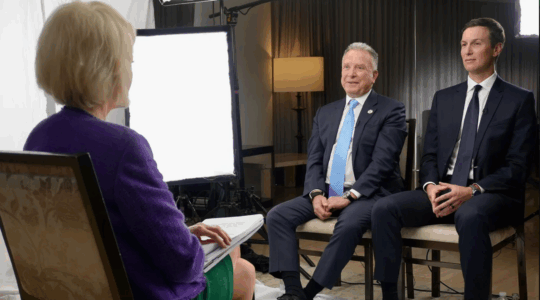Taking the pulse of Reform development directors: Last year was a difficult one for Reform synagogues, but the development directors at some of the country’s congregations appear to be feeling optimistic and are looking toward recovery, according to several who took part in a conference in New York this week.
Reform Synagogue Development Professionals is not a large group, with only about 25 development directors from the estimated 900 Reform congregations. But the 25 represent a pretty decent cross-section of the field.
I spoke Wednesday with four of the participants — Patsy Goodman of Temple Emanuel in Dallas; Robyn Cimbol of Temple Emanuel in Manhattan; Jann Blitz of Temple Emanuel in Birmingham, Ala.; and Maxine Lowy of Temple Oheb Shalom in Baltimore — just after their most recent meeting (the group has been gathering annually since 2003).
Each of them described 2008-09 as a year in which they had to lower expectations for their annual appeals and cut expenses, and one in which their congregations enacted program cuts, salary freezes and minor layoffs.
New York’s 3,000-member Temple Emanuel, for instance, reduced its annual appeal goal from $1.5 million in 2008-09 to $1.2 million in 2009-10 and saw a significant drop in its endowment. Oheb Shalom cut its goal from $275,000 last year to $250,000 this year.
Meanwhile, last year marked the first time that Temple Emanuel in Dallas did not reach its fund-raising goal, falling about $50,000 short of the $725,000 standard it had set.
At this time last year, each fund-raiser said, they had been bracing for the worst. Already they were grappling with membership attrition resulting from the deaths of older congregants. And with membership costs ranging from about $1,100 for an individual to upward of $2,200 for a family, synagogues were fearing that younger members would start to jump ship.
But the worst never came, the development directors said.
Temple Emanuel in New York "never saw the huge exodus from our synagogues we had anticipated,” Cimbol said. “Especially with high unemployment in financial sectors, we anticipated that people would move out of the city or would spend diminished or no dues on synagogues. But we have not seen this in the Reform synagogues in New York.”
Each of the four directors has seen members cut back. Many who had held onto extra seats for the High Holidays that belonged to either deceased relatives or grown children who moved away have given them up. And they have had to reduce membership fees for many in financial distress. But other synagogue members stepped up to help fill the gaps, the directors said.
All four said they expect to meet or surpass their fund-raising goals for this year, and they were able to take the last year to plan long term, trying to turn the recession into an opportunity to streamline and look forward with endowments and renewed efforts to cull legacy gifts.
In New York, Temple Emanuel started a campaign to raise $2 million for its endowment — and met the goal.
“While we were distressed by the hit to our endowment, it was not as bad as we feared it would be,” Cimbol said. “But the foundation board looked at the entire process as long term. We did not lose it all. We chose to look at it as a long-term process.”
Birmingham’s Temple Emanuel used the recession to make the case to its donors that an endowment was necessary, said Blitz, who is also the chairwoman of the Reform development directors’ group.
“We used the year for rebuilding and strategic planning,” she said. “We launched a fund-raising effort to build endowment for the future. Our annual dues from our 700 families were stable, but the endowment effort involved greater participation. We significantly grew our participation by 20 to 25 percent.”
But the key, they said, was that the synagogues did not panic and did not act rashly. They cut where they had to and tried to minimize the impact for their members. And most importantly they looked at the situation as an opportunity to foster the relationships they have with their congregants. By being there for them now, even when the donors may be in distress, the fund-raisers think they will make long-term gains once the economy fully recovers.
“We feel very optimistic because we have weathered the storm and with the least amount of disruption to congregants,” Lowy of Oheb Shalom said. “Their synagogues are still there for them. We are still giving pastoral support. We are still there for them. We have nurtured and supported our relationships. And we will be better positioned over the next few years to go after big gifts with confidence because we know it is a good relationship.”
Despite reducing its appeal goal from $275,000 to $250,000, Oheb Shalom already is at $300,000 with a significant chunk of the year to go.
JTA has documented Jewish history in real-time for over a century. Keep our journalism strong by joining us in supporting independent, award-winning reporting.





